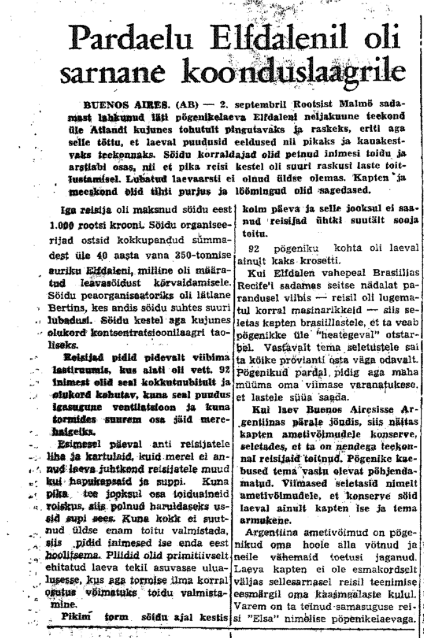Boats

“Livet ombord Elfdalen liknade ett koncentrationsläger,” rapporterade Stockholms-Tidningen Eestlastele, 14 januari 1951.
Elfdalen
Elfdalen var den sista båten som transporterade baltiska flyktingar till Argentina. Arvids Bertins, som framgångsrikt hade seglat Elsa till Argentina, var också kapten ombord Elfdalen. Skeppet var en 40 år gammal ångbåt på 350 ton som en grupp letter hade köpt och omvandlat till en motorbåt. Båten lämnade Limhamn i smyg 2 september 1950, utan att ha blivit inspekterad för sjöduglighet, och utan varken flagg eller dokument. Det är okänt hur många människor det fanns ombord, men den mest troliga rapporten nämner 38 män, 26 kvinnor och 20 barn. Majoriteten var letter. Det är inte känt huruvida det fanns några estländare ombord, men det är möjligt i och med att Stockholms-Tidningen Eestlastele rapporterade om resan och de tuffa levnadsförhållandena ombord. Varje flykting behövde betala 1000 svenska kronor för resan.
Inga stopp i några hamnar registrerades, förutom i Recife, Brasilien, där Elfdalen reparerades under sju veckors tid. Stockholms-Tidningen Eestlastele rapporterade 12 november 1950 att när skeppet anlände till Pernambuco, Brasilien, hade dåliga levnadsförhållanden ombord lett till bråk och polisen behövde ingripa. Slutligen kom Elfdalen fram till Buenos Aires, Argentina, omkring jul 1950.
Stockholms-Tidningen Eestlastele publicerade en artikel på förstasidan den 14 januari 1951, där de jämförde livet ombord Elfdalen med ett koncentrationsläger. Artikeln berättade att organisatörerna hade lurat passagerarna vad gällde matförråd, speciellt när det kom till barnens måltider. Det fanns ingen doktor ombord, vilket hade utlovats, och kaptenen och besättningen var ofta fulla, vilket ledde till frekventa slagsmål. Flyktingarna klagade till argentinska myndigheter att medan de hållits på en svältdiet, hade kaptenen, hans fru och besättning ätit ordentliga måltider. Rapporter tydde på att resan med Elfdalen endast hade organiserats med tanke på vinst, och med flyktingarnas välfärd i andra hand.
Kända besättningsmedlemmar:
- Kapten Arvids Bertens (Bertins) och fru
